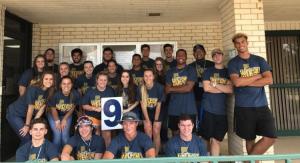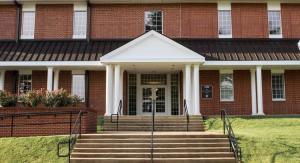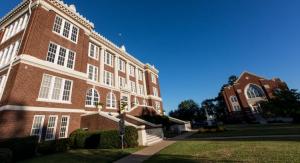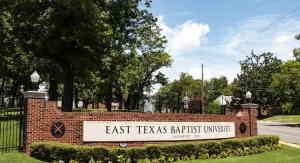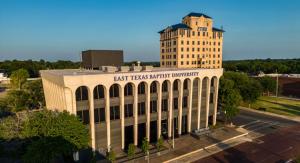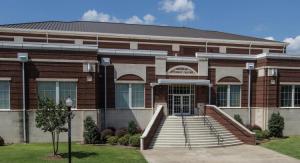Policy Statement
It is the policy of East Texas Baptist University to prohibit the use, possession, or distribution of alcohol or illegal drugs by students or University personnel on University owned or controlled property or in conjunction with any University activity.
Community Standards
The ETBU campus, all other University-owned or leased property, and all University-sponsored activities – on or off campus – are alcohol, drug, and tobacco free. All students are prohibited from having alcohol, drugs, and/or tobacco on campus, either on their person, in their on-campus residence, or in their automobile, at any time.
The Student Code of Conduct requires students to be in compliance with all federal, state, and local laws regarding the use of alcohol, drugs, tobacco, and other controlled substances to include, but not limited to, the sale, use, transportation, exchange, delivery, possession, or manufacture of said substances. ETBU also considers the abuse of prescribed medication to be a violation of the Student Code of Conduct.
- Alcohol Policies
-
East Texas Baptist University prohibits possession and/or consumption of alcoholic beverages on campus property or at any University-sponsored activities. Students found in possession of alcohol on campus or at any University event will face disciplinary sanction. Students who participate in or are involved in any activity or gathering on campus where alcohol is present may also receive disciplinary sanction.
Students may also be sanctioned for signs and symptoms of alcohol use, including, but not limited to, the smell of alcohol on the breath, slurred speech, and impaired mobility. Sanctions also pertain to empty alcohol containers of any kind, whether or not the container is labeled as an alcoholic beverage. Possession of empty alcohol containers anywhere on campus, including vehicles, residence halls, apartments, houses, and all other campus buildings, will be treated as an alcohol violation.
Students may not purchase alcohol for minors or make alcohol available to minors. Students who do so will face disciplinary sanction. Students who participate in or are involved in any activity or gathering which provides or makes alcohol available to minors, either on or off campus, may also receive disciplinary sanction.
The University reserves the right to require a student to show proof of an alcohol-free condition. Refusal of sobriety testing will be treated as a positive result.
- Drug Policies
-
East Texas Baptist University prohibits the possession, use, sale, transportation, exchange, delivery, and manufacturing of illegal drugs and controlled substances, as well as drug paraphernalia of any kind.
The University reserves the right to require a student to show proof of a drug-free condition. A failed drug test or refusal of drug testing, which will be treated as a positive result, will be considered a drug violation resulting in disciplinary sanction. The University reserves the right to use canine detection services whenever drugs are suspected on ETBU property.
NOTE: The distribution of, or evidence or circumstances indicating the intent to distribute, illegal drugs on or off campus is a serious offense and may result in suspension or dismissal, regardless of the student’s record of conduct.
- Amnesty Statement
-
Students who seek help for substance abuse problems can be assured that confidentiality will be observed within the limits of the law. Where federal and state laws permit, the University will not impose sanctions when a student seeks assistance for substance abuse or any other problem of a similar nature.
In addition to on-campus amnesty, during the 2011 Texas Legislative Session, a new law was passed commonly referred to as the 911 Lifeline Law. This new law states that "there is no penalty for consumption or possession of alcohol by a minor if the minor was the first person to request emergency medical assistance in response to the possible alcohol overdose of the minor or another person, and remained on the scene until the medical assistance arrived, and cooperated with medical assistance and law enforcement personnel." [Texas Alcoholic Beverage Code Sec. 106.04, 106.05]
- Legal Penalties and Sanctions Applicable to Drug and Alcohol Use
-
A. Federal Penalties and Sanctions
21 United States Code 844(a):
1st conviction: Up to one year imprisonment and fined at least $1,000 but not more than $100,000, or both.After 1 prior drug conviction: At least 15 days in prison, not to exceed 2years, and fined at least $2,500 but not more than $250,000, or both. After 2 or more prior drug convictions: At least 90 days in prison, not to exceed 3 years, and fined at least $5,000 but not more than $250,000, or both.
Special sentencing provisions for possession of crack cocaine: Mandatory at least 5 years in prison, not to exceed 20 years, and fined up to $250,000, or both, if:
(a) 1st conviction and the amount of crack possessed exceeds 5 grams.
(b) 2nd crack conviction and the amount of crack possessed exceeds 3 grams.
(c) 3rd or subsequent crack conviction and the amount of crack possessed exceeds 1 gram.Special sentencing provisions for possession of flunitrazepam: Imprisoned for not more than 3 years and/or fined.
21 United States Code 853(a)(2) and 881(a)(7):
Forfeiture of personal and real property used to possess or to facilitate possession of a controlled substance if that offense is punishable by more than one year imprisonment. (See special sentencing provisions re: crack.)21 United States Code 881(a)(4):
Forfeiture of vehicles, boats, aircraft, or any other conveyance used to transport or conceal a controlled substance.18 United States Code 922(g):
Ineligible to receive or purchase a firearm.
Miscellaneous:
Revocation of certain federal licenses and benefits, e.g., pilot licenses, public housing tenancy, etc., are vested within the authorities of individual federal agencies.B. State Penalties and Sanctions
Texas Penal Code Sec. 49.02:
Being intoxicated in public such that one is a danger to oneself or others is a Class C misdemeanor, punishable by a fine of up to $500.Texas Alcoholic Beverage Code Sec. 1.05, 101.31:
It is illegal to possess or distribute alcoholic beverages in a dry area. Violation of this law is a Class B misdemeanor and carries a penalty of up to $1,000 and/or up to 1 year of confinement.Texas Alcoholic Beverage Code Sec. 106.02, 106.04-106.05, 106.071:
The purchase, possession, or consumption of alcoholic beverages by a person under 21 years of age subjects that person to a fine of up to $500 for the first offense and at least $250 up to $2,000 for the second offense and/or 180 days confinement.Texas Alcoholic Beverage Code Sec. 106.06:
Furnishing alcoholic beverages to a minor is a Class A misdemeanor and punishable by a fine of up to $4,000 and/or up to one year in jail.Texas Education Code Sec. 37:122:
The possession of an intoxicating beverage on the grounds of any public school is a Class C misdemeanor and carries a penalty of up to $500.Texas Penal Code Sec. 49.04:
Driving under the influence of alcohol is a Class B misdemeanor and punishable by a fine of up to $500 and a minimum confinement of 72 hours and/or up to 180 days in jail for the first offense and up to a $2,000 fine and a minimum of 30 days confinement and and/or up to 180 days in jail for subsequent offenses.If found with an open container in the person's immediate possession, the minimum confinement period extends to six days.
Texas Alcoholic Beverage Code Sec. 106.07:
A person under 21 years of age who misrepresents his or her age for the purpose of purchasing alcohol beverages commits a Class C misdemeanor and may be punished by a fine of not less than $250 or more than $2,000, confinement in jail for a term not to exceed 180 days, or both.Texas Health and Safety Code Sec. 481.102-106, 481.115-118:
The illegal distribution, possession, or use of controlled substances may be punished by 5 years to life in prison and up to a $250,000 fine.Texas Health and Safety Code Sec. 481.112-120:
The delivery or possession of controlled substances with the intent to manufacture controlled substances is punishable by a jail term of 10 years to life and up to a $250,000 fine.Texas Health and Safety Code Sec. 481.122:
The distribution of marijuana to a minor is punishable by 2 to 20 years in prison and/or up to a $10,000 fine.C. Local Penalties and Sanctions
Marshall Code Sec. 2A-1 - Operation of dance hall near place of sale:
It shall be unlawful for any person to operate a dance hall or club at which dancing takes place, or to sponsor a dance hall, dance, or club at which dancing takes place within three hundred (300) feet of any store, building or structure licensed for the sale of alcoholic beverages within the corporate limits of the City of Marshall.Marshall Code Sec. 2A-2 - Dancing near place of sale prohibited:
It shall be unlawful for any person to dance at a dance hall, club, or public dance within three hundred (300) feet of any store, building or structure licensed for the sale of alcoholic beverages within the corporate limits of the City of Marshall.Marshall Code Sec. 2A-3a - Sales near school, church or hospital:
It shall be unlawful for any dealer to sell alcoholic beverages where the place of business of such dealer is within three hundred (300) feet of any church, public school or public hospital.Marshall Code Sec. 2A-4 - Sales prohibited on Christmas, Easter:
Hereafter, it shall be unlawful for any person to sell or offer for sale any alcoholic beverage within the corporate limits on Christmas Day and on Easter Sunday.Marshall Code Sec. 2A-5 - Zoning restrictions:
It shall be unlawful for any person to sell wine, malt liquor, beer or any other type of alcoholic beverage at any place within any of the following residential zoning districts of the City of Marshall:- R-1 Single-Family Dwelling District
- R-2 Single-Family Dwelling District
- R-3 Single-Family Dwelling District
- Duplex Dwelling District
- Apartment Dwelling District
Marshall Code Sec. 2A-6 - Penalty for violation:
Any person violating the provisions of this chapter shall be deemed guilty of a misdemeanor and upon conviction shall be punished by a fine of any sum not to exceed two hundred dollars ($200.00).Marshall Code Sec. 21-10 - Drinking alcoholic beverages in public places, prohibited:
It shall be unlawful for any person to have in his possession or to drink any intoxicating liquor at any church or on any church property; at any school or on any property used for school purposes; at any place of amusement; or at any baseball game, football game, basketball game, track meet, or at any school function held within the corporate limits of the city. - Health Risks Associated with Drug or Alcohol Use
-
Narcotics/Opiates such as opium, morphine, and heroin can cause euphoria, drowsiness, respiratory depression, constricted pupils, and nausea. The symptoms of an overdose of narcotics are slow and shallow breathing, clammy skin, convulsions, coma and possible death. Persons experiencing withdrawal from addiction to narcotics can experience watery eyes, runny nose, yawning, loss of appetite, irritability, tremors, panic, cramps, nausea, chills, sweating, depression, hypertension, and possible death.
Depressants such as barbiturates and Quaaludes can cause slurred speech, disorientation, and drunken behavior. An overdose of a depressant results in shallow respiration, clammy skin, dilated pupils, weak and rapid pulse, coma and possible death. Withdrawal symptoms include anxiety, insomnia, tremors, delirium, convulsions, and possible death.
Stimulants such as cocaine, crack cocaine, and methamphetamine can cause increased alertness and euphoria, and increased pulse rate and blood pressure, insomnia and loss of appetite. An overdose of stimulants results in agitation, an increase in body temperature, hallucinations, convulsions, and possible death. Withdrawal symptoms include apathy, long periods of sleep, irritability, depression, and disorientation.
Hallucinogens such as LSD and amphetamines cause illusions and hallucinations, and poor perceptions of time and distance. The effects of an overdose include psychosis and possible death.
Marijuana and hashish can cause euphoria, increased appetite, relaxed inhibitions and disoriented behavior. The effects of an overdose include fatigue, paranoia, rapid heart rate, and possible psychosis. Withdrawal symptoms include insomnia, hyperactivity, and decreased appetite.
Alcohol consumption causes a number of marked changes in behavior. Even low doses significantly impair the judgment and coordination required to drive an automobile safely, increasing the likelihood that the driver will be involved in an accident. Low to moderate doses will
also increase the incidence of a variety of aggressive acts, including spouse and child abuse. Moderate to high doses cause marked impairments in higher mental functioning, severely altering a person’s ability to learn and remember information. Very high doses cause respiratory depression and possible death. If combined with other depressants of the central nervous system, much lower doses of alcohol will produce the effects just described.Repeated use of alcohol can lead to dependence. Sudden cessation of alcohol intake is likely to cause withdrawal symptoms, including severe anxiety, tremors, hallucinations and convulsions. Alcohol withdrawal can be life threatening. Long-term consumption of large quantities of alcohol, particularly when combined with poor nutrition can also lead to permanent damage to vital organs such as the brain and liver. Mothers who drink during pregnancy may give birth to infants with fetal alcohol syndrome. These infants have irreversible physical abnormalities and mental retardation. In addition, research indicates that children of alcoholic parents are at a greater risk of becoming alcoholics.
- Alcohol and Drug Abuse Support Services
-
Student Engagement will assist students seeking help for alcohol and drug abuse problems through various functions.
- Assessment – meeting with students to assess the extent of their problem with alcohol or other drugs.
- Intervention – working with various personnel in an attempt to reach out to people in trouble and provide them access to appropriate help.
- Short-term Counseling – as appropriate, providing counseling to students who can benefit from therapy sessions.
- Referral/Aftercare – assisting students in finding specialized care including outpatient therapy or inpatient treatment.
- Campus Awareness – working with student organizations to coordinate projects or programs to focus attention on the dangers of drug and alcohol abuse and also problems of dependency.
- Education – giving presentations on the effects of chemical dependency and/or alcohol and drug abuse.
Long-term rehabilitation and therapy is not provided through the University, but information and referrals to such services available locally will be furnished.
The following organizations provide assistance to individuals dealing with drug and alcohol problems:
- Health Core Mental Health Crisis Line – 1.800.832.1009
- Marshall Good Shepherd Medical Center Switchboard – 903.927.6000
- Oak Haven Recovery Center – 903.938.5149
- Texas Department of Human Services – 903.938.7751
- Women’s Center of East Texas – 800.441.5555
- East Texas Council of Alcoholism and Drug Abuse – 903.753.7633 or 800.441.8639
- Substance Abuse Hotline – www.samhsa.gov or 1.800.662.HELP
- Texas Al-Anon (Alcohol Abuse) – www.texas-al-anon.org or 325.320.1071



